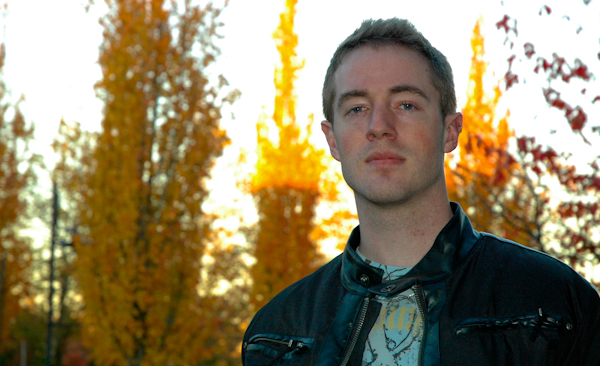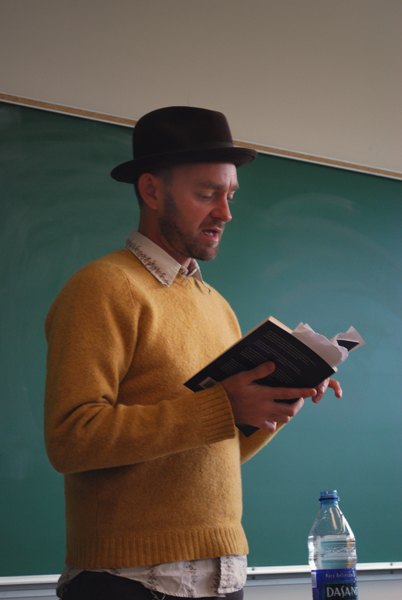Audio: Sonic poet paints scenes with sound
November 6, 2010 by Jeff Groat · 2 Comments

Kwantlen creative writing student Mark Funston crafts new sounds using old poetic forms. His style of sonic poetry is a cousin of slam poetry, and Funston likes to add his own twist using traditional forms such as the villanelle or the triolet. Each has a unique internal rhyme scheme that adds to the “sonic” qualities of his work. Photo by Jeff Groat
[audio: SonicPoetry.mp3]
Ever since the 2010 Olympic Winter Games in Vancouver, people have been tuned into the world of contemporary poetry after Shane Koyczan’s “We Are More” performance. Kwantlen Student Mark Funston isn’t a slam poet, but his work is like Koyczan’s in that its author’s voice breathes it to life.
Sonic poetry is the name Funston uses for his work, and it is phonetically charged with both old and new style. By playing with classical poetic forms, with rigid rhyme schemes and structures, he is able to add an extra layer to his work.
Funston has completed his minor in creative writing at Kwantlen, but is not considering launching a career as a professional poet.
Video: Anosh Irani has a way with words
October 27, 2010 by Jeff Groat · 1 Comment
Indian-born author Anosh Irani appeared at this year’s Vancouver International Writers and Readers Festival, and read from his new novel, Dahanu Road. The reading took place at an event called Home Grown, which featured several Vancouver-based authors and poets. Irani moved to Vancouver from Mumbai, India in 1998 to study creative writing at UBC. In 2009, he was writer-in-residence for Kwantlen’s creative writing program. He has has received a number of Canadian literature awards for his plays, novels and poetry.
Video by Jeff Groat and Amanda Punshon
October 2, 2009 by Kristi Jut · 1 Comment Chris Hutchinson reads from his latest book "Other People's Lives," at the Surrey campus on Monday, Sept. 26. (Kristi Jut photo) There’s much ado about the creative writing program at Kwantlen. Though the first live poetry reading of the semester was attended by a modest group of 20-some students, the small crowd was lively and inquisitive on Monday, Sept. 28. The reading featured noted B.C. poets Marguerite Pigeon and Chris Hutchinson, who came to speak with the students about the nature of writing. Each read from their latest published works, featuring vastly different poetic styles, yet both agreed on the writing process as natural and instinctual. Hutchinson, wearing a mustard-yellow sweater and wool cap, read from his poetry anthology “other people’s lives,†with a Ginsberg-esque drone and ‘60s-‘70s beat tonality. “My process is very intuitive, I never know where a poem is going to take me,†he said. Pigeon’s book “Inventory,†on the other hand, explored her relationships with inanimate objects, personifying, beautifully, their attributes. The students had much to ask the established writers about the writing process, including their inspirations and their roadblocks. “Resist!†Hutchinson laughed, addressing situations when being told the correct way to formulate poems. But can creative writing really be taught? Kwantlen students wanted to know. “It’s a funny thing to have writing in school because it puts two things that are at odds together,†Pigeon said. “It’s built like that [because] it pushes people through learning whether they like it or not and they come out a little more structured. But at the same time writing is not about following any structure, it’s very intuitive.†So where is the creative writing program going? “The program is going towards integrating with the interdisciplinary arts,†said creative writing professor Matthew Rader. The program, which has already grown by over one-third in enrolment this year, has several possible outcomes. “[Learning writing is important] because writing to start with is the primary negotiator in all disciplines and [excellence] is achieved by imagination in that skill,†said Rader. Pigeon assured students that all people are writers, whether it be filling out surveys, chatting on facebook or sitting down to write some fiction. Still, when it came to serious writing, some students said that they couldn’t help but be defensive about their work. “The more you write,†Pigeon offered, “the less you care that one thing you wrote was bad.†Pigeon said she wanted to write her entire life, but didn’t think it would be realistic, so she was “a journalist instead.†“If you believe in writing,†she said, “it will save you.†That is the sentiment that Rader wanted to get across by having live readings in school. “[I want] to show aspiring writers that professional writers exist,†he said. “There’s a chance that these people are like us and they’re right here.†According to Rader, there are five different possible futures for the creative writing students at Kwantlen, but at the moment it’s important for “people in university to be engaged in the community.†To keep in touch with the writing program at Kwantlen, follow them on Twitter or attend these readings:First poetic readings of semester show lively creative writing scene



